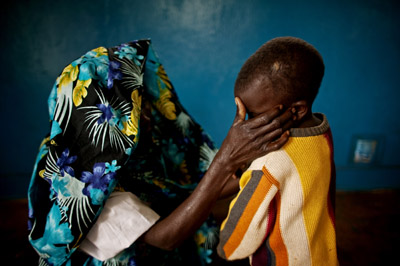
On Monday, a landmark verdict was handed down in the Democratic Republic of the Congo. For the first time in the nation’s history, a commanding officer was tried and sentenced for conflict-related sexual violence. Lt. Col. Kibibi Mutware was convicted on four counts of crimes against humanity in a mobile court held in the village of Baraka in the volatile eastern region.
According to the court’s findings, Col. Mutware ordered troops to attack the village of Fizi and to beat and rape civilians on New Year’s Day. Mutware was sentenced to no more than 20 years in prison, although he maintains his innocence.
Among the other 10 soldiers tried for the attack and subsequent mass rape, three of Mutware’s officers also received a 20-year sentence, five received less severe sentences, one officer was acquitted, and one—who is a minor—will be tried in juvenile court, reported the Associated Press’s Michelle Faul from Baraka.
After the attack by elements of the Congolese national army, or FARDC, doctors in Fizi reported treating 62 women for rape. Monday’s sentencing was a result of four days of agonizing testimony from 49 women who testified before a panel of judges. They described hellish beatings and sexual violence they endured; some testified that after the attack they hid in the nearby forest for three weeks. The women’s stories were later recounted in open court, but their identities were protected due to security concerns and social stigma associated with rape victims.
The U.N. Population Fund estimated that at least 8,000 women were raped in eastern Congo in 2009 – a startling statistic but one that likely underestimates the prevalence of rape. Sexual violence has become a systemic weapon of war used by soldiers and militia groups in the area to intimidate and punish civilians. Witnesses in the Fizi trial testified that the attacks were committed in retaliation for the death of a soldier who had been involved in a dispute with a local shop owner. The soldiers had attacked the village, going door-to-door beating and raping victims from 7 p.m. until 6 a.m. the next day.
The sentencing of Col. Mutware and his officers is a significant step toward ending impunity for sexual violence. In a statement issued today, the U.S. State Department commended Kinshasa’s “swift” action in response to the January atrocities:
By taking such steps, the DRC government is strengthening the message to perpetrators of sexual violence that no one is immune from prosecution for this horrific crime. Accountability for sexual and gender based violence is a shared priority for our governments and is an essential component to ending impunity for violent crimes and bringing peace and stability to the eastern DRC.
Although close to 50 rape survivors testified in court, many others are presumed to have stayed silent for fear of being shunned by their husbands or communities, or out of concern that the military would retaliate. The total number of victims from the attack remains unknown.
The women who did testify will each receive $10,000 in compensation from the government—twice the amount given to victims in previous cases. Presiding Judge Col. Fredy Mukendi also ordered that additional damages must be paid to victims for “humiliation, degradation of their health, social stigmatization, risk of divorce, and possibility of HIV,” as the Associated Press reported.
Even after Monday’s sentencing, women in the affected communities believe that some attackers escaped justice. However, Mutware and the 10 men who stood trial were the only perpetrators identified after the Fizi attacks. “It is now imperative that the remaining perpetrators are found and brought to justice,” said Margot Wallström, the U.N.’s top official focused on sexual violence in conflict. “It is equally important that the victims of and witnesses to instances of sexual violence are protected, as well as their families.”

